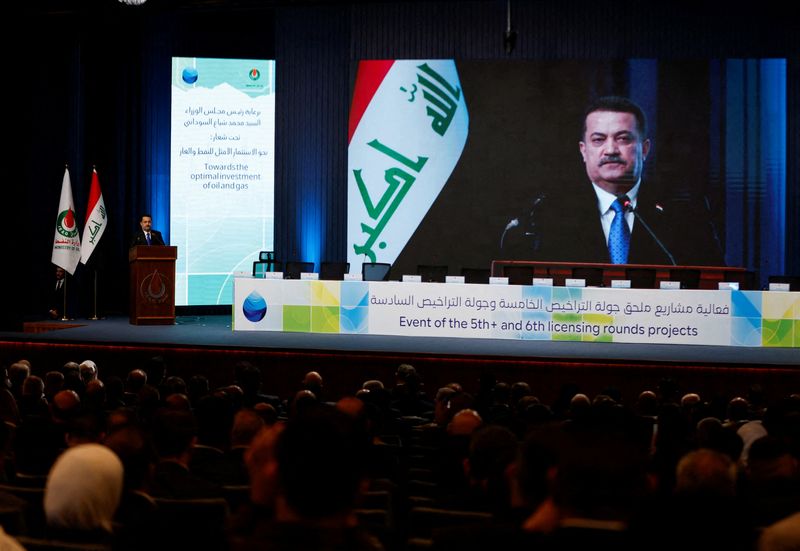Commodities
Chinese companies win licensing bids to explore Iraq oil and gas fields

By Moayed Kenany, Timour Azhari and Adam Makary
BAGHDAD (Reuters) -Chinese companies won bids to explore five Iraqi oil and gas fields on Saturday in a licensing round for hydrocarbon exploration that was primarily aimed at ramping up gas production for domestic use.
An Iraqi Kurdish company also took two of the 29 projects up for grabs in the three-day licensing round across central, southern and western Iraq, which for the first time includes an offshore exploration block in the country’s Arab Gulf waters.
Iraq aims to lure billions of dollars of investments to develop its oil and gas sector as it looks to ramp up local petrochemicals production and end imports of gas from neighbouring Iran that are currently key to producing power.
More than 20 companies pre-qualified for the licensing round, including European, Chinese, Arab and Iraqi groups.
There were notably no U.S. oil majors involved, even after Iraqi Prime Minister Mohammed Shia met with representatives of U.S. oil firms during an official visit to the United States last month.
Five bids were won on Saturday by Chinese companies.
Zhongman Petroleum and Natural Gas Group (ZPEC) took the northern extension of the Eastern Baghdad field, in Baghdad, and the Middle Euphrates field that straddles the southern Najaf and Karbala provinces, the oil ministry said.
China’s United Energy Group Ltd won a bid to develop the Al-Faw field in southern Basra, while ZhenHua won a bid to develop Iraq’s Qurnain field in the Iraqi-Saudi border region and Geo-Jade won a bid to develop Iraq’s Zurbatiya field in the Wasit.
remove ads
.
Two oil and gas fields were taken by Iraq’s KAR Group – the Dimah field in eastern Maysan province, and the Sasan & Alan fields in Iraq’s northwestern Nineveh province – the ministry said.
Around 20 more projects are open for bidding on Sunday and Monday.
Falah Al-amri, the Iraqi prime minister’s advisor for oil and gas issues, said the government hoped the new projects would raise oil production to 6 million barrels per day by 2030 from around 5 million now.
The government also wants the projects to produce enough so that, along with plans to all-but eliminate gas flaring by 2030, Iraq could end imports.
“Its too early to talk about (gas) exports. We want to get self-sufficient,” Al-amri told Reuters.
Iraq, OPEC’s second-largest oil producer after Saudi Arabia, at one time had targeted becoming a rival to the Gulf Arab kingdom with output of over a tenth of global demand.
But its oil sector development has been hampered by contract terms viewed as unfavourable by many major oil companies as well as recurring conflict and political paralysis.
Growing investor focus in recent years on environmental, social and governance criteria have also had an effect.
Western oil giants such as Exxon Mobil Corp (NYSE:) and Royal Dutch Shell (LON:) Plc have departed from a number of projects in Iraq while Chinese companies have steadily expanded their footprint.
Commodities
Oil prices rise; U.S. crude inventories plunge, Russia-Ukraine truce eyed
Commodities
India’s Reliance to stop buying Venezuelan oil over US tariffs, sources say
Commodities
Oil prices climb on Venezuela supply worries

 Forex4 years ago
Forex4 years agoForex Today: the dollar is gaining strength amid gloomy sentiment at the start of the Fed’s week

 Forex3 years ago
Forex3 years agoUnbiased review of Pocket Option broker

 Forex3 years ago
Forex3 years agoDollar to pound sterling exchange rate today: Pound plummeted to its lowest since 1985

 Forex4 years ago
Forex4 years agoHow is the Australian dollar doing today?

 Cryptocurrency4 years ago
Cryptocurrency4 years agoWhat happened in the crypto market – current events today

 World3 years ago
World3 years agoWhy are modern video games an art form?

 Commodities4 years ago
Commodities4 years agoCopper continues to fall in price on expectations of lower demand in China

 Economy3 years ago
Economy3 years agoCrude oil tankers double in price due to EU anti-Russian sanctions





























